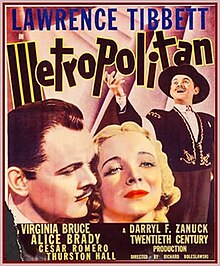The Fox Film Corporation was an American independent film production studio formed by William Fox (1879–1952) in 1915, by combining his earlier Greater New York Film Rental Company and Box Office Attraction Company.
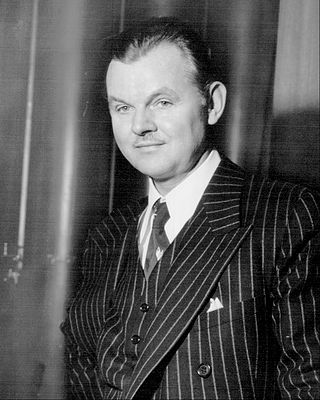
Lawrence Mervil Tibbett was an American opera singer and recording artist who also performed as a film actor and radio personality. A baritone, he sang leading roles with the Metropolitan Opera in New York City more than 600 times from 1923 to 1950. He performed diverse musical theatre roles, including Captain Hook in Peter Pan in a touring show.

The Rogue Song is a 1930 American pre-Code romantic and musical film that tells the story of a Russian bandit who falls in love with a princess, but takes his revenge on her when her brother rapes and kills his sister. The Metro-Goldwyn-Mayer production was directed by Lionel Barrymore and released in two versions, with and without sound. Hal Roach wrote and directed the Laurel and Hardy sequences and was not credited. The film stars Metropolitan Opera singer Lawrence Tibbett—who was nominated for an Academy Award for Best Actor for his performance—and Catherine Dale Owen. Laurel and Hardy were third-billed; their sequences were filmed at the last minute and interspersed throughout the film in an attempt to boost its potential box-office appeal.

20th Century Studios, Inc. is an American film studio owned by the Walt Disney Studios, a division of Disney Entertainment, in turn a division of The Walt Disney Company. It is headquartered at the Fox Studio Lot in the Century City area of Los Angeles, leased from Fox Corporation. Walt Disney Studios Motion Pictures distributes and markets the films produced by 20th Century Studios in theatrical markets.

Universal City Studios LLC, doing business as Universal Pictures is an American film production and distribution company, a division of Universal Studios, which is owned by NBCUniversal, a division of Comcast.

Major film studios are production and distribution companies that release a substantial number of films annually and consistently command a significant share of box office revenue in a given market. In the American and international markets, the major film studios, often known simply as the majors or the Big Five studios, are commonly regarded as the five diversified media conglomerates whose various film production and distribution subsidiaries collectively command approximately 80 to 85% of U.S. box office revenue. The term may also be applied more specifically to the primary motion picture business subsidiary of each respective conglomerate.
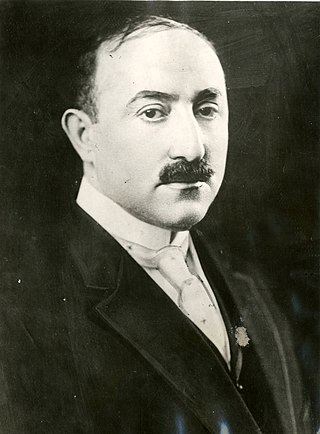
Wilhelm Fried Fuchs, commonly and better known as William Fox, was a Hungarian-American film industry executive who founded the Fox Film Corporation in 1915 and the Fox West Coast Theatres chain in the 1920s. Although he lost control of his film businesses in 1930, his name was used by 20th Century Fox and continues to be used in the trademarks of the present-day Fox Corporation, including the Fox Broadcasting Company, Fox News, Fox Sports and Foxtel.

20th Century Fox Records was a wholly owned subsidiary of film studio 20th Century Fox. The history of the label covers three distinct 20th Century Fox-related operations in the analog era, ranging chronologically from about 1938 to 2011.
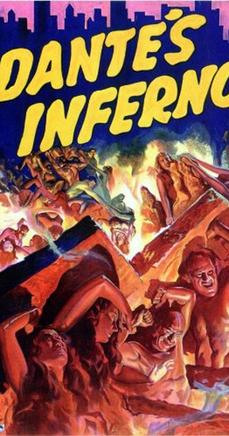
Dante's Inferno is a 1935 American drama horror film starring Spencer Tracy and loosely based on Dante Alighieri's Divine Comedy. The film remains primarily remembered for a 10-minute depiction of hell realised by director Harry Lachman, himself an established post-impressionist painter. This was Fox Film Corporation's last film to be produced under the Fox Studios banner before the company merged with Twentieth Century Pictures to form 20th Century-Fox Film Corporation.

Twentieth Century Pictures, Inc. was an independent Hollywood motion picture production company created in 1933 by Joseph Schenck and Darryl F. Zanuck from Warner Bros. The company product was distributed by United Artists (UA), and leased space at Samuel Goldwyn Studios.
The second incarnation of Touchstone Television was an American television production company that was a subsidiary of Disney Media Networks' Walt Disney Television owned by The Walt Disney Company. It was founded in 2014 from the merger of Fox Television Studios and Fox 21, and given its second name in mid-2020 following the acquisition of 21st Century Fox by Disney.

The Independent Moving Pictures Company (IMP) was a motion picture studio and production company founded in 1909 by Carl Laemmle. The company was based in New York City, with production facilities in Fort Lee, New Jersey. In 1912, IMP merged with several other production companies to form Universal Film Manufacturing Company, later renamed Universal Pictures Company with Laemmle as president.

20th Century Animation, Inc. is an American animation studio located in Century City, Los Angeles. Formed in 1994, it is organized as a division and label of 20th Century Studios, a subsidiary of the Walt Disney Studios, and is tasked with producing animated feature-length films. At one point, 20th Century Animation had two subsidiaries: Fox Animation Studios, which was shut down on June 26, 2000, and Blue Sky Studios, which was closed on April 10, 2021. Walt Disney Studios Home Entertainment distributes the films produced by 20th Century Animation in home media under the 20th Century Home Entertainment banner.
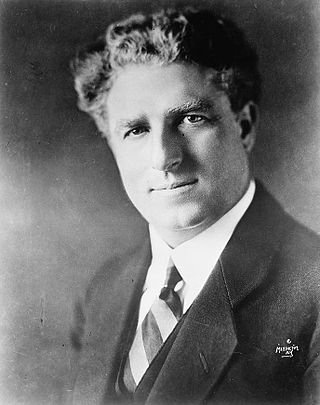
Giovanni Martinelli was an Italian operatic spinto tenor. He was associated with the Italian lyric-dramatic repertory, although he performed French operatic roles to great acclaim as well. Martinelli was one of the most famous tenors of the 20th century, enjoying a long career at the Metropolitan Opera in New York City and appearing at other major international theatres.
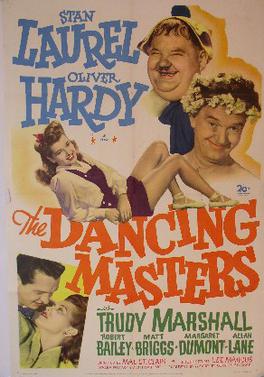
The Dancing Masters is a 1943 black and white American comedy film directed by Malcolm St. Clair, produced by 20th Century-Fox, and featuring Laurel and Hardy. A young Robert Mitchum has a small, uncredited role as a gangster posing as an insurance salesman.
The Skouras Brothers Enterprises Inc. was an American movie theater chain from the early days of film-making based in St. Louis, Missouri. It was owned and operated by three brothers: Charles, Spyros and George. Even though it never became as important and famous as other family based companies, like the Warner Brothers, its members came to play important roles in American film industry.
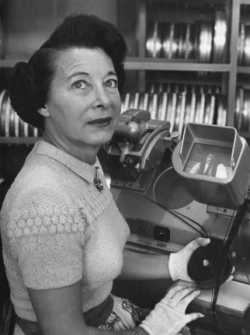
Barbara "Bobby" McLean was an American film editor with 62 film credits.

Under Your Spell is a 1936 American romantic comedy film with music directed by Otto Preminger. The screenplay by Frances Hyland and Saul Elkins is based on a story by Sy Bartlett and Bernice Mason. It was a remake of the American Spanish-language film, Las fronteras del amor.

The Emperor Jones is an opera in two acts with a prologue and interlude composed by Louis Gruenberg to an English-language libretto adapted by the composer from Eugene O'Neill's 1920 play, The Emperor Jones. It premiered on January 7, 1933, at the Metropolitan Opera in New York City with Lawrence Tibbett in the title role. Set on an unnamed island in the West Indies, the opera tells the story of African American Brutus Jones, a former Pullman porter and ex-convict who escaped to the island, set himself up as its tyrannical "Emperor", and became rich by exploiting the natives. The natives start a revolt against him, and as he tries to escape through the jungle, he is haunted by visions of his past life and the man he had murdered. As the natives close in, he commits suicide using the silver bullet which he had worn around his neck as a good-luck charm. With a score that incorporates elements of jazz and negro spirituals, The Emperor Jones was the eleventh American opera to premiere at the Met, and has continued to be performed into the 21st century, albeit rarely.
